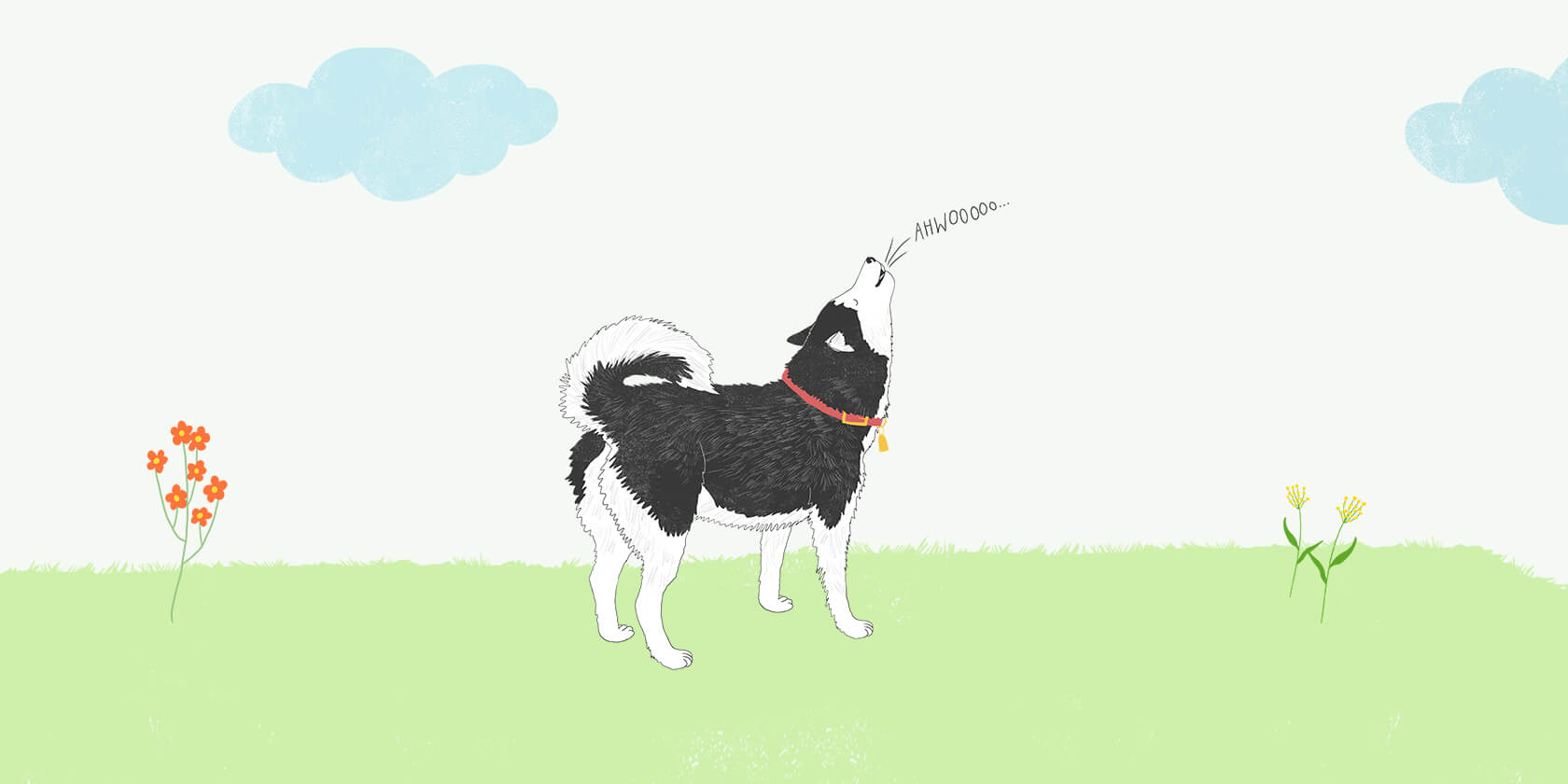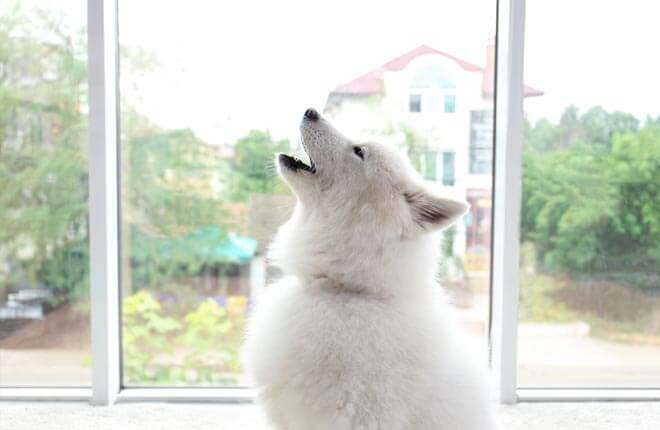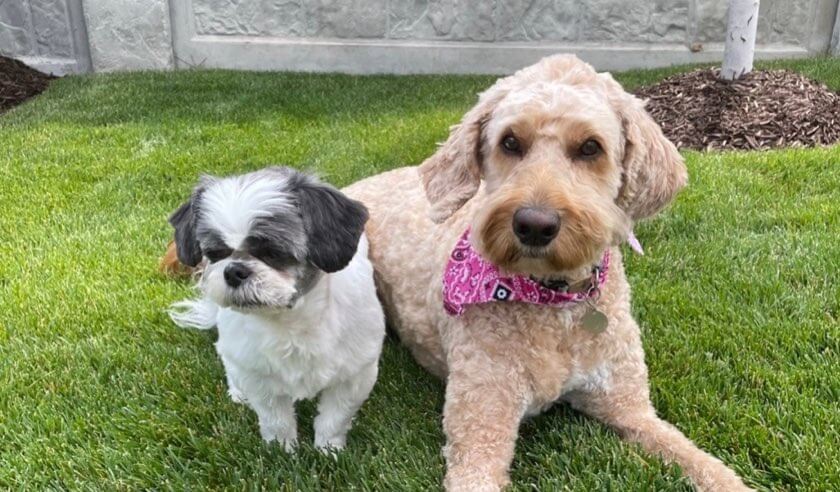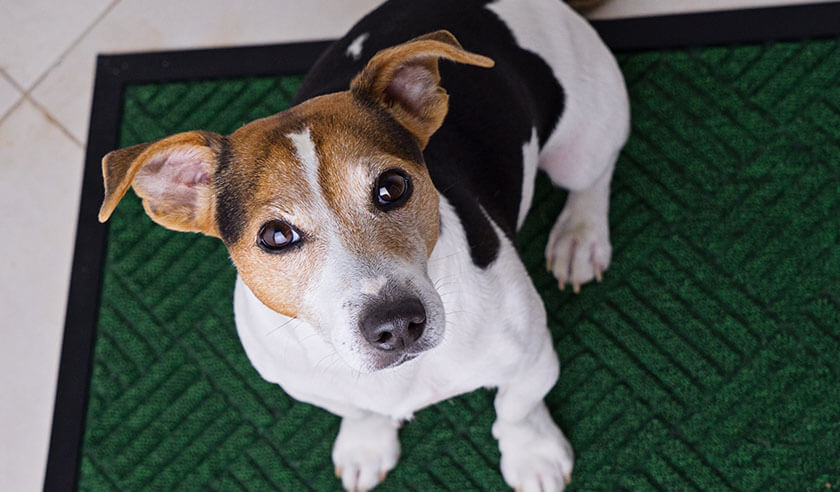Dogs make a lot of different sounds. But big or small, hound, Husky, or Havanese, there’s no mistaking the head-back “arrrooooo” of a dog howl. It might be a mournful howl or an excited yipping when you return home after a long day at work. Sometimes we love it, and other times it drives us crazy. But why does your dog howl, and what in the world does it mean?

Reasons Dogs Howl
Howling is part of normal dog communication and a behavior that they inherited from their ancestors. Domestic dogs don’t howl as much as wolves do, which perhaps we should be grateful for. Some breeds like the Husky or Alaskan Malamute howl quite a lot, which may be due to a combination of genetics and behaviors related to the kind of work those breeds do. Hound dogs are known for their howling and baying, which may be due to their breed history of working in packs while on an exciting hunt. But dogs of all breeds howl, and why dogs howl can mean different things depending on the context.
- In response to certain sounds. Has your dog ever leaned their head back and let out a howl when they heard a siren, train, or bell nearby? This response to a high-pitched sound is commonly experienced by dog owners everywhere. There are different theories about why dogs react this way. It could be that the sound is similar to hearing other dogs howling in the distance to alert you of what could be an approaching threat, or it may just hurt their ears.
- To signal their location. Wolves howl to communicate across distances and let other pack members know where they are. Dogs use this form of communication similarly.
- To keep intruders away. Howling is often combined with barking and other vocalizations when they are protecting their territory from unwanted visitors. They want to make sure that others know they’ve already laid claim to a particular area and to stay away.
- Excitement. Your dog might start to howl because they are excited about something, especially when they are reuniting with their loved ones (you!) after being apart. Or they might have found something exciting, such as hounds when they catch a scent while tracking. This kind of howling is celebratory and a good example of the use of howling as social communication and as part of a group activity.
- To get your attention. If you’ve routinely responded to your dog’s howling by giving them attention in some way, they may have learned that letting out a howl is the best way to get your attention when they want it. It can be hard to not respond to a howl, just as it’s hard to not respond to barking, and dogs learn quickly what works to get what they want.
- Emotional distress. Howling can signal emotional distress and can be a symptom of separation anxiety. A dog howls because they want to reunite with their group and are calling out in the hope of finding them. Howling may also indicate boredom, nervousness, or fear. Senior dogs may also begin howling due to cognitive decline — they may feel disoriented or confused and start to howl out of distress.
- Physical distress. Howling can sometimes indicate a dog is injured or in pain (although most dogs in pain do not tend to vocalize). If your dog is usually quiet and begins howling seemingly out of nowhere, visit your veterinarian to ensure they are not experiencing physical discomfort or pain.
Why Do Dogs Howl in Their Sleep?
If your dog howls in their sleep, there's no need to be worried. Dogs dream just like we do, and watching them dream can be quite entertaining. Their nose and paws may twitch, and they may even bark or howl in their sleep. Should you wake your dog up when they’re dreaming? It’s best to let them dream on, as interrupting their sleep cycle, especially during REM sleep when dreams occur, can backfire. Startling a dog awake can lead to a bite and can be disorienting or distressing to a dog sharply woken from a deep sleep.
How to Stop Your Dog from Howling
You should never punish your dog for howling. Their howls are trying to tell you something, and we don’t want to punish a natural dog behavior. Instead, we can learn why dogs howl and make sure their needs are being met to help diminish the frequency of their howling and teach them how to be quiet when asked.
- Sound triggers. If your dog mainly howls when they hear a siren or another particular sound, usually they will stop when the sound stops. However, teaching them a quiet cue that comes with treats can help snap them out of their howling song. Being able to cue your dog to be quiet using positive reinforcement is the best way to interrupt howling and prevent the cacophony from escalating.
- Attention-seeking. If they howl to get your attention, focus on teaching them what to do instead to get that attention. This may be as simple as teaching them to sit in front of you or bring you a toy. Just make sure you’re positively rewarding that alternate behavior consistently and not waiting until after they’ve started howling to make you look their way.
- Excitement. If you prefer your dog not to howl when they’re excited, make sure there’s another quieter behavior they can engage in when they’re wanting to celebrate. This could be playing a game of fetch with you when you get home (it’s hard to howl when there’s a toy in their mouth). And if the howling starts and you want to spare your neighbors, simply redirect your dog to a more appropriate and quieter activity. Treats always help.
- Emotional or physical distress. If you are concerned your dog is howling due to physical pain, your veterinarian should examine them to determine what may be going on and begin treatment. Howling due to emotional distress, such as separation anxiety, negative associations with being confined in a crate, or out of fear require a more in-depth training plan to address the underlying cause. Working with a veterinary behaviorist or a certified canine behavior consultant or a can help your dog better handle scenarios where their howling is anxiety-related.
ZPC-01315R1



.jpg)

